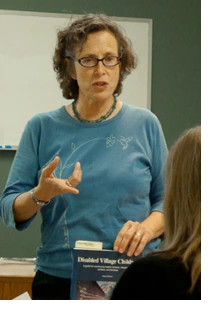
Tracy Carroll has been a practicing physical therapist in Tucson for over 35 years. Prior to her PT profession, she taught special and elementary education for both the Bureau of Indian Affairs and United Farmworkers. Joining the University of Arizona Family & Community Medicine Department in 1997 as lecturer and associate faculty, she has served as a clinical preceptor with the CUP Shubitz Refugee Family Clinic and as a clinician and residency mentor at the monthly Phoenix based Hansen’s Disease Clinic.
She is currently adjunct faculty with the UA College of Public Health and in Latin American Studies. Her field work is primarily with Mexico border communities promoting health, safety and economic security. Linking health with the global economy, her longitudinal research interests in El Salvador and Northern Mexico include: Occupational Health, Microcredit, Maquila Organizing and Water & Sanitation. Through the UA Office of Equity, Diversity and Inclusion, Ms. Carroll developed and co-taught the course “Conversantes” for the COM as a service-learning course that provides bilingual Spanish-speaking premed students with training and opportunities to volunteer as medical interpreters in health care clinics, aiming to increase representation of Hispanics in medicine.
In 2008, Ms. Carroll was a founding member and continues to be a consultant for the Arizona Sonora Border (ARSOBO) Projects for Inclusion. Now a binational, Mexico-based NGO, ARSOBO trains and then hires individuals with disabilities to construct high-quality, low-cost medical devices that they themselves use and make available for others.
Since 1997 Ms. Carroll has co-directed and taught in the annual interdisciplinary COM Global Health Course. From 2012 she, Ron Pust and Arleen Heimann directed the COM Global Health Distinction Track. In 2010, Ms. Carroll was a faculty founder of the South Campus FCM Residency’s Global Health track. Integrating curriculum that is strongly rooted in service-learning, Ms. Carroll has engaged UA COM residents with community and border -based humanitarian groups in which she herself serves. Retiring from her academic position in 2018, Ms. Carroll continues to volunteer to promote health education and human rights.

